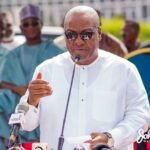Former President John Dramani Mahama has unveiled an ambitious economic agenda under the Ghana Framework for Industrialization, Revitalization, Support, and Transformation (Ghana FIRST) program. This flagship initiative promises to revamp Ghana’s economy, create jobs, and enhance prosperity for all Ghanaians by focusing on industrial growth, domestic trade empowerment, export promotion, and the formalization of the informal economy.
The program aims to accelerate manufacturing growth and create sustainable jobs by investing in strategic industries such as aluminum production, pharmaceuticals, textiles, and vehicle assembly. These industries will not only reduce import dependency but also enhance Ghana’s global market competitiveness.
Key components include revitalizing existing factories such as the Komenda Sugar Factory, Pwalugu Tomato Factory, and Zuarungu Meat Factory, while supporting new industrial hubs like Juapong Textiles and the Obuasi Industrial Hub. These efforts are expected to breathe new life into local economies, particularly in regions historically underserved by industrial investments.
Ghanaians will also benefit from investments in advanced technologies for producing fertilizers, plastics, and synthetic materials, and the promotion of modern furniture and apparel manufacturing industries. The initiative also prioritizes small-scale businesses, providing technical and financial support to artisanal enclaves such as Abossey Okai and Suame Magazine.
A groundbreaking aspect of the plan is the incentivization of local production of menstrual hygiene products, a move aligned with the NDC’s Free Sanitary Pads initiative. This not only ensures affordability and accessibility for women and girls but also creates new employment opportunities in the manufacturing sector.
Moreover, the establishment of modern markets in the six newly created regions promises to enhance trade efficiency and uplift rural economies.
The Ghana FIRST program represents a comprehensive and forward-thinking approach to addressing Ghana’s economic challenges, ensuring inclusive growth and national development




